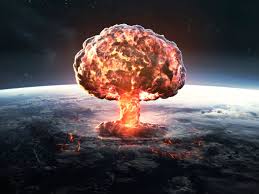
Signs of Nuclear War is about to happen
Signs of Nuclear War is about to happen
Introduction to Nuclear War
The threat of nuclear war looms like a dark cloud over humanity. With the world more interconnected than ever, tensions between nations can escalate in an instant. We’ve learned from history that once the button is pressed, there’s no turning back. The devastation caused by previous conflicts serves as a haunting reminder of what is at stake.
But how do we know when things are getting serious? What signs should we be watching for to gauge whether we’re on the brink of disaster? This blog post will delve into those critical indicators and explore what you can do to stay informed and prepare for anything that may come your way. It’s essential to understand our past, recognize current global dynamics, and take proactive steps towards safety while hoping for peace amidst uncertainty.
History of Previous Nuclear Wars
Nuclear warfare has left an indelible mark on history. The most notable event occurred in 1945 when the United States dropped atomic bombs on Hiroshima and Nagasaki. These bombings not only ended World War II but also ushered in a new era of global politics.
The Cold War intensified nuclear tensions, with the U.
S. and Soviet Union engaged in a dangerous arms race. The Cuban Missile Crisis of 1962 brought the world to the brink of catastrophe, highlighting just how close humanity came to widespread destruction.
Since then, various conflicts have threatened to escalate into nuclear confrontations, such as India-Pakistan skirmishes or North Korea’s provocative tests. Each incident serves as a stark reminder that while direct nuclear wars may be rare, the threat remains ever-present amid geopolitical rivalries and evolving technologies.
Current Tensions Between Countries
Tensions between nations have escalated in recent years. Key players on the global stage are often at odds, fueled by political disagreements and territorial disputes.
The rise of military posturing is particularly alarming. Countries are increasing their defense budgets and showcasing advanced weaponry, leading to a climate of fear and uncertainty.
Diplomatic relationships that once seemed stable are now strained. Sanctions, trade wars, and hostile rhetoric only deepen divisions.
In this charged atmosphere, any miscommunication can spiral into conflict. Leaders must navigate these treacherous waters carefully; one wrong step could lead to catastrophic consequences.
Amidst this backdrop of tension lies an urgent need for dialogue. Without open channels of communication, misunderstandings may fester, pushing us closer to the brink of war. Each nation bears responsibility for fostering peace rather than discord as we move forward in uncertain times.
Signs of Potential Nuclear War
As tensions rise globally, certain signs can indicate the looming threat of nuclear war. Increased military drills and troop movements often signal preparations for conflict. Countries may bolster their arsenals or test new weaponry, showcasing their readiness.
Rhetoric from political leaders also plays a crucial role. Heightened aggressive language or ultimatums can escalate fears among nations. Diplomatic relations breaking down is another red flag; when dialogue ceases, misunderstandings can spiral out of control.
Cyberattacks targeting critical infrastructure might hint at impending hostilities. Nations could be testing vulnerabilities before escalating to physical confrontations.
Public awareness becomes paramount during such times. If media coverage intensifies around military actions or geopolitical crises, it’s worth paying attention to potential implications on a global scale.
Preparing for a Nuclear War
Preparing for a nuclear war might seem extreme, but being informed can provide peace of mind. Start by creating an emergency plan with your family. Discuss where to meet and how to communicate if separated.
Stocking up on essentials is also crucial. Non-perishable food items, clean water, and first aid supplies should be part of your inventory. Remember that during a crisis, access to resources may become limited.
Consider investing in protective gear like masks or radiation detectors. These tools can help you assess risks more effectively.
Designate a safe room in your home—preferably one without windows. This space should be stocked with necessary supplies and act as a refuge until the threat subsides.
Stay updated on current events through reliable news sources; knowledge is invaluable when tensions rise. Understanding the situation helps you make informed decisions about safety measures and preparedness strategies.
What to Do During a Nuclear Attack
If a nuclear attack occurs, your immediate reaction is crucial. First, seek shelter as quickly as possible. Ideally, find a basement or an interior room without windows.
Once inside, close all doors and windows to limit exposure to radioactive fallout. Turn off ventilation systems to avoid outside air entering the space.
Grab essentials: water, food that doesn’t require cooking, and a flashlight with extra batteries. It’s essential to have enough supplies for at least 72 hours.
Stay informed through battery-operated radios or emergency services on your phone if you’ve managed to keep it charged. Information will be key in determining when it’s safe to come out.
Remain calm and support those around you. Panic can lead to poor decisions during this critical time. Focus on staying safe until help arrives or conditions improve.
Conclusion: Staying Informed and Hope for Peace
Staying informed is essential in these uncertain times. Knowledge empowers us to understand the complexities of international relations and the potential threats we face. Keeping an eye on credible news sources can help demystify events that may seem alarming.
No one wants to imagine a world where nuclear conflict becomes a reality. Yet, it’s crucial to remain aware of escalating tensions and diplomatic efforts aimed at de-escalation. The more we know, the better equipped we are to advocate for peace.
Hope remains vital in this situation. Throughout history, humanity has faced challenges far greater than itself and emerged stronger through cooperation and understanding. Engaging with community initiatives that promote peace can foster positive change, even amidst turmoil.
While it’s natural to feel anxious about global affairs, focusing on constructive actions helps channel those feelings into something meaningful. Together, we can work towards a future devoid of fear—one where dialogue triumphs over discord and understanding leads the way toward lasting peace.

